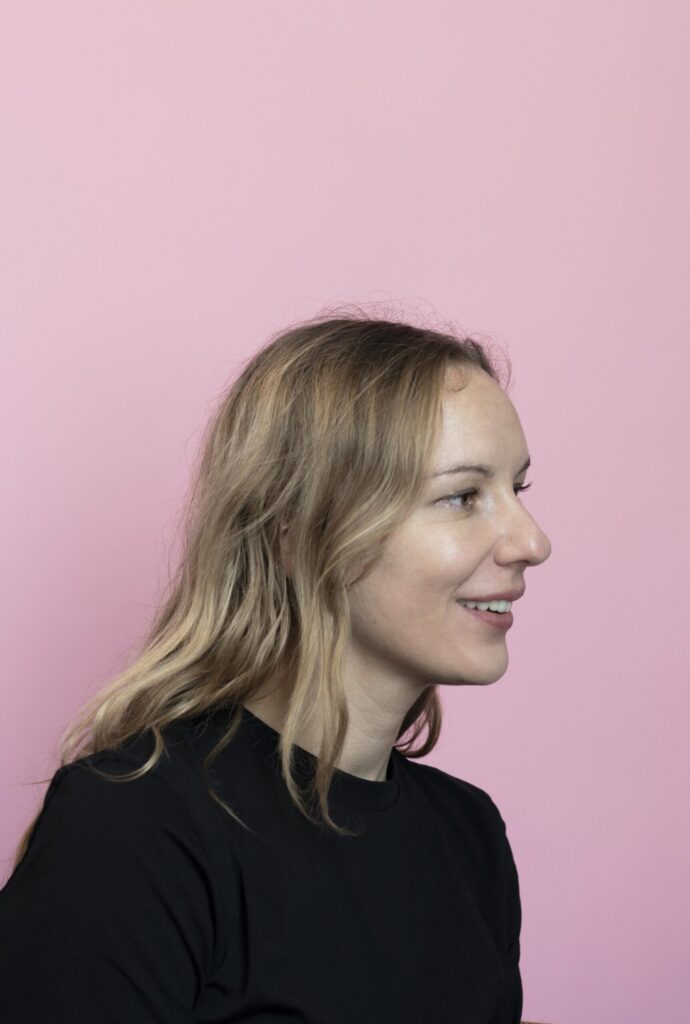FUTURE WITH DISABILITIES
Presentation by Zofia nierodzińska
Thu 11 September, 7 p.m.
Language: German
Presentation by Zofia nierodzińska on her curatorial practice, which is based on connectedness and accessibility.
Based on the publication “Politics of (In)Accessibility” (2023, ed. Zofia nierodzińska), which was a continuation of the exhibition of the same name, nierodzińska will share her experiences as a curator and cultural worker. The focus is on marginalized positions that are connected by their universal vulnerability.
The Future with Disabilities is a universalist project that brings marginalized positions to the forefront of interest and uses them as a starting point for developing futuristic, speculative-realistic concepts. This practice is characterized by its radical accessibility, which materializes in the form of an affinity institution. This institution is self-reflective, open, and critical at the same time. It functions translocally in the form of a platform or networked infrastructure, drawing on the experiences of actors critical of institutions, while at the same time seeking more affirmative points of reference such as “The Radical Democratic Museum” (Nora Sternfeld) or the “Museum of Contemporary Art” (Jerzy Ludwiński). Practicing connectedness means that the institution is willing to take responsibility for what it says and where it fails. It means fearlessly thinking about what it could be, together with what it has been until now. Connectedness is practiced by living concrete moments of solidarity, which sometimes also requires disintegration.
The event is part of the Temporary Gallery's residency programme as well as the series The Curatorial Unknown. The Curatorial Unknown is a series of meetings dedicated to curatorial practice initiated by Temporary Gallery Cologne and prepared in collaboration with a group of curators and institutions from Cologne and the region. The meetings are open to everyone interested in curating.
RESIDENCY PROGRAMME
Zofia nierodzińska
We are delighted to welcome our new resident Zofia nierodzińska to Cologne. Zofia will be staying in Cologne from September 1 to 18, presenting her curatorial practice in an event and offering feedback meetings for artists and curators. She will also visit several institutions, including Kunstlerhaus kat18, kaethe:k Kunsthaus, Sammlung Zander, and Domid e.V..
FEEDBACK MEETING FOR ARTISTS AND CURATORS
with Zofia nierodzińska
12 and 15 September
Cologne-based artists and curators have the opportunity to have personal one-hour meetings with Zofia, present their own work or projects and receive feedback.
Individual registration with preferred date and time until Thursday, 11 September 5 p.m. at info@temporarygallery.org.
Zofia nierodzińska, PhD: author of texts, curator, visual artist, junior professor at the Academy of Arts in Szczecin (Poland); deputy director of the Arsenal Municipal Gallery in Poznań between the years 2017-22; editor-in-chief of Magazyn RTV, platform on art and activism from 2019 to 2024; editor of books: “Politics of (In)Accessibility” (2023), “Acting Together” (2022), “Creative Sick States: AIDS, CANCER, HIV” (2021). Her recent curatorial projects were: “FERNBEZIEHUNGEN” at Kunstverein Ost (KVOST), Berlin and “Geographies of Collectivity in Times of Crises: Berlin Vienna, Graz, Minsk, Kharkiv, Pristina” at alpha nova&galerie futura, Berlin. She works on the art of post-socialist countries, with the special focus on accessibility and migration. She studied at the University of Arts in Poznan (PhD) and at the Universität der Künste in Berlin (MA). She lives and works in Berlin. More information can be found at: www.znierodzinska.com.
About the residency programme:
It has become a declared, if often only half-heartedly pursued, goal of cultural institutions to question and renew their own structures with regard to diversity. However, diversity must not just be a temporary program or a hip agenda, but must go deeper. The question must not only be who gets access to cultural education and its institutions, but who is even able to consider cultural and/or creative work as a career perspective.
Although so-called "art brut" – art by people with a mental illness or a mental disability – is very well established and highly valued, "art brut" artists and their artworks are excluded from the usual art scene: "art brut" functions as a separate area of the art world with its own exhibitions in which only "art brut" artists participate. As a result, they very rarely meet with artists without disabilities. Although the intention behind "art brut" exhibitions is certainly positive and worthy of support, there is no real inclusion here – the artworks are "isolated" in separate exhibitions instead of being included in exhibitions of artists without illness or disability. In order to address this problem in the long term, the Temporary Gallery. Centre for contemporary art in Cologne, would like to implement an idea in 2024 that focuses on empowerment and inclusion at a deeper level: a residency program for cultural workers – in cooperation with several partners from Cologne – with the main goal: to counteract the exclusion of so-called "outsider art" in the long term to deal with this problem in the long term, the Temporary Gallery. Center for Contemporary Art in Cologne, initiated a project that focuses on empowerment and inclusion on a deeper level: a residency program for cultural workers with the main goal: to counteract the exclusion of so-called "Outsider Art" in the long term.
The aim of the program is to invite several international artists to Cologne. The guests visit partner institutions and meet artists in their studios. In addition, individual "feedback sessions" are offered, talks lasting around 1–2 hours, for which artists can register. The residents also present their work at an event in the Temporary Gallery.
Photo:
Katarzyna Wasowska
